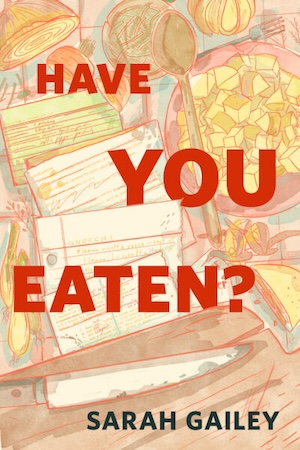Vimes has decided not to be intimidating today, so it falls to Angua. Checks out.
Summary
Moist comes back to Harry with contracts signed for railway building. Far away, a dwarf named Bedwyr talks to his wife about the grags and she urges him not to join them. Moist rides his (government loaned) golem horse into Vetinari’s office to complain about having to spend so much time wheedling landowners to built the railroad, but Vetinari isn’t interested and furthermore decides that the new priority is building the first branch of the railroad to Quirm, leaving Drumknott and the dark clerks to oversee the initial branch going to Sto Lat. Lu-Tze has a chat with Ridcully about the monks being worried because it’s not “steam engine time,” though he’s not personally concerned about it. Dick Simnel is woeful over not being qualified to even get a guild apprenticeship due to inventing his own discipline, but Moist advises him not to worry and to call on Harry King’s niece, who he’s fond of. The very first railway journey from Sto Lat to Ankh-Morpork occurs with press and important official invited, and everything goes off without a hitch. Fred and Nobby patrol the train yard area and Fred wonders if they’ll need railway policemen.
Moist finally gets home after much more land negotiating to find that Harry has hired a troll named Trouble to keep unwanted visitors away from the yard. Moist gets himself the night off and goes home to Adora Belle, who has been following his progress through the clacks system, something he hadn’t know she could do. The wizards go on their first train ride with the help of Ponder, who has become a train spotter. Moist is watching people in the yard and realizes that two toddlers are on the tracks right as the Iron Girder is bearing down; he rescues them, making himself a hero again, and then heads back to Harry to tell him that he has to shut down for a week to implement safety measures. Harry agrees wholeheartedly, and as Moist keeps talking he comes up with other moneymaking ideas for the railway (including a middle-class car to get more people to aspire to wealth) because his brain can’t stop. He comes up against too much pushback trying to get the railway through Quirm due to their familial property laws, but the Marquis des Aix en Pains gives him advice on a better route: an area of Badlands owned by the government, but covered in bandits and goblins. Moist can smell change in the air…
Ardent situates himself at the dwarf bar Dirty Rat in Ankh-Morpork and subtly inserts himself into conversations to get the population riled about the railroad and ready to act out. Moist tells Harry that they have a place where they can build the railroad, but he’ll need Harry and his enforcer squad to clear out the bandits from the area. They head out and manage this task with relative ease, delivering the bandits to the Marquis. A young dwarf was kidnapped and threatened by the grags to do as he’s told or suffer consequences. Moist asks Adora Belle if he can bring Of the Twilight the Darkness to meet with the Quirmian goblins, and they stay with the Marquis briefly, only to find that they’re being spied on by a dwarf. Moist and Of the Twilight the Darkness meet the Quirmian goblins and the goblin sells the group a story about a better life in Ankh-Morpork. He insists to Moist that they have to take the group now, but on the way back to the railway station under construction, they discover that all the workers have been murdered by dwarfs. Moist feels rage overcome him and leads the goblins in a fight against the dwarfs, killing three of them himself. Several goblins die. He comes to and is mortified, though Of the Twilight the Darkness is impressed. Moist asks the Marquis to join them with an iconograph so they have documentation of what happened.
After documentation, they put the bodies on the handcar and head back toward the border. Moist has to deal with several humans being difficult about the band of goblins with him and sets them straight in short order. He brings the goblins to Adora Belle, who has them sleep in Tump Tower, and is then brought in by the Watch for questioning about the whole massacre. Vimes winds up praising him for doing what he could not, and advises him to be cautious, then tells him that Vetinari is waiting to talk to him. On his way to the palace, a dwarf tells him that he’s on the gram’s list of people to be put to death. Moist berates Vetinari for not telling him this, but Vetinari explains that he’d already told Adora Belle and she’d wanted to surprise him with it. He very gently reminds Moist to maintain his place as an agent of serendipity and sends him on his way. King Rhys is besides himself over the actions of Ardent and his crew; he banishes them, branding anyone who helps them traitors of the Scone. A dwarf working with the grags makes to sabotage the Iron Girder and dies; Nobby thinks the train defended herself. Moist asks Simnel about it and they wonder whether the train is developing some kind of soul due to all the attention and worship of the masses.
Commentary
This book is another one that has almost dreamlike qualities in the transitions, but I feel it most in the section when Moist saves the kids from the train because the scene just kind of blooms in the midst of the rest of the narrative. The same goes for the growing recognition around the Iron Girder forming a sort of soul or being. The way that these books effortlessly imbue personhood and power onto items, games, and concepts is an endless reminder of our effect on our own reality.
It’s incredibly relevant that Moist is going through some stuff in this book that requires him to stare his own morality in the face, as his role in getting the railroad off the ground is less theatrical than it is tactical this time around. He’s generally averse to violence, but the narrative essentially shows us that’s partly because he hasn’t been exposed to much of it. Seeing terrible violence enacted on others breaks something in him. With that in mind, it’s only fitting that he has to meet both Vetinari and Vimes after the massacre, as they both feel the need to check in—Vetinari to make it clear that this won’t be happening again without consequences, Vimes to look him in the eye as someone who knows how it feels to be subsumed by the power of the dark and make sure he’s alright.
Moist essentially goes through the same transformation Vimes did in Snuff, coming to terms with the sapience of goblins through a very ugly ordeal and then finding himself in a position of needing to defend them to every human who doesn’t want them around. Of the Twilight the Darkness is doing most of the heavy lifting to start, as Moist is stunned by the goblin’s intelligence. But it’s worth noting that when he makes mention of this, Of the Twilight the Darkness lights his pipe again, which the narrative notes “made him somehow more human.” The steps that the human mind takes to render sentience onto others is noted even at the points when it’s kind of an ugly anthropomorphizing process, as it is here.
One of the keys to understanding the chain of events here is that it never occurs to Moist that this might happen as he’s working on all the permissions for the tracks. He finds himself baffled over the idea that the railway could become a target for this kind of attack because he’s in showman mode; he’s not thinking about what the railway represents to anyone looking in. And this is a book that’s very concerned with the inexorable path of progress and how vehemently it is resisted regardless of inevitability.
And most of the progress is good, of course—goblins getting to be people, peace between the dwarfs and trolls, getting fresher seafood in Ankh-Morpork—but there are still bits that are downright heinous. For instance, it’s pretty horrifying that in his rant to Harry about the need for safety systems around the railway, Moist also simultaneously invents the concept of tier class-based car systems on the trains, and believes that teaching people to strive for class elevation by giving them some perks for a little more money is some sort of gift to the masses. Harry also believes this, of course, being the definition of what people often mean when they cite bootstraps theory to those on the economic lower rungs.
Progress is also this too. We are always taking the nasty bits with the essential and inherent good ones.
Asides and little thoughts
- The most French thing ever when the Marquis says that their goblins make their own wine and immediately corrects himself to say “wine-like substance.” He means the snails, sure, but you know what he really means.
- I love the distinction of the goblins becoming ceramics artisans by making Unggue pots with their magic taken out. Very similar to cultures with other art forms that have cultural significance, but can be modified to prevent cultural theft—first that comes to mind is Maori ta moko tattoos, which are meant to be specific to the individual and their family heritage, while there are alternative stylistically similar designs that tourists and tattoo enthusiasts can get without appropriating someone’s personal history.
- The fact that Moist suddenly thinks to ask a golem horse if they can talk is so good. In keeping with how his brain works, but also one of those questions that you sort of kick yourself for not asking if you didn’t?
- Vetinari told Adora Belle that they were on the grags list, but not Moist… The Patrician’s preference for meeting with the wives of the difficult men in his life, and being secretly, infinitely more frank with them is maybe one of his most endearing traits? It only bothers me that we never get to see it. Show his teas with Sybil and Adora Belle, I want the gossip.
Pratchettisms
And now Harry King, Cess Pit Man, was metamorphosing into National Treasure.
Simnel looked even more haunted while Moist stood with his mouth metaphorically open and listened to the meticulous Mr. Simnel blaming himself for being a genius.
As always in these matters, everything had to wait until everything else was ready.
It was, in short, a light that hid from light, and it had a reason to hide.
Nevertheless, they looked like a people who had been hammered hard on the anvil of fate and had been laminated with a natural bravado, which did not entirely hide their wounds.
As stares went, their eyes were not baleful or angry, they were just… hopeful, in the grudging way of people who had to learn pessimism as a survival tactic.
Moist was somewhat disorientated, because Vimes was acting in a way that, if looked at forensically, might even have been somewhere within the circumference of friendly, rather like, he supposed, an alligator yawning.
It was like shaking hands with a boxing glove full of walnuts.
Next week we’ll read up to:
It was your slave but, in a sense, it might be the other way around.










